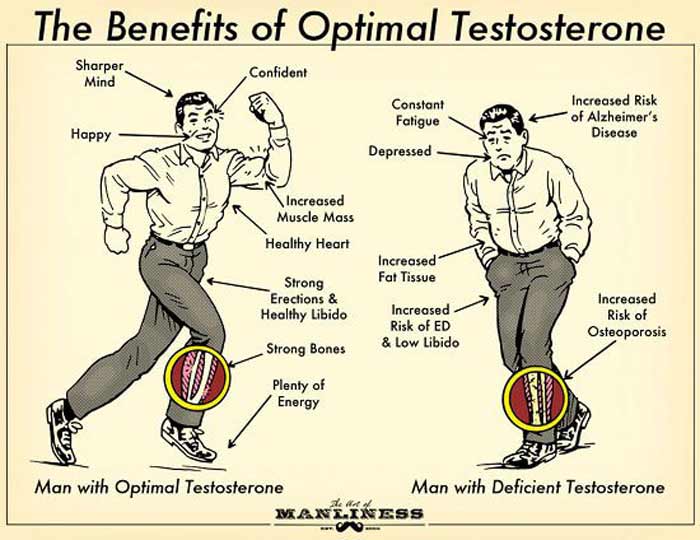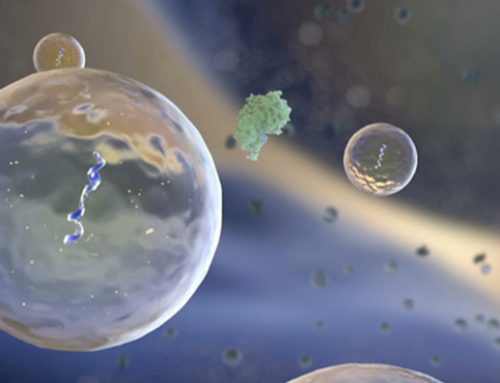Feeling like a shadow of your former self? Gaining fat weight around the midsection? Not so interested in the things that were once your passion? No longer feel focused and mentally alert? Could care less about sex? Hormone imbalance could be the issue and Testosterone Deficiency or “Low T” may be robbing you of your once dominant youth and vitality!
The number of men diagnosed with “Low T” has grown dramatically in recent years due to an increasing awareness of the importance of hormones in a man’s health and well being. Research shows that about 1 out of 4 men over the age of 30 may have Low-T. Circulating testosterone levels decline progressively with age, starting in the second and third decade of life, owing to defects at all levels of the hypothalamic-pituitary-testicular axis. Your doctor may consider prescribing testosterone if you report classic signs and symptoms of testosterone deficiency and if appropriate lab tests confirm that your hormone levels are low. But testing for testosterone deficiency requires a comprehensive understanding of the intricacies of hormone balance before one makes a commitment to what may be lifelong therapy.
Inaccurate, misinterpreted lab results or lack of diagnostic acumen can lead to either a false diagnosis or misdiagnosis of a case of testosterone deficiency. And because Low–T treatment is not without risk, it is important to have your testosterone levels and associated hormones accurately assessed before considering treatment.
Often men are referred to the our practice with only a single lab value ordered by their physician: Total testosterone. This single lab value, while part of the diagnostic puzzle is insufficient alone to make an accurate diagnosis or to determine a potentially curable underlying cause to testosterone deficiency.
Below are 7 steps to consider before starting Low-T therapy.
Step One: Find the Right Doc
Finding the right doctor can be tricky, however there are many physicians that specialize in the diagnosis, treatment, and management of men with hormone deficiencies. If your doctor does not have you do the basics such as completing an ADAMS Questionnaire, a Lifestyle Questionnaire and a Nutrition Questionnaire then it is time to get up and walk out. Obtaining a clear diagnosis that determines testosterone deficiency and discovering if there is a treatable underlying cause to the Low T is essential to your long term health and well being.
Work with a physician who understands the complexities of diagnosing, treating and managing Low T. You’ll need a game plan much like the head coach of a professional sports team. If a care provider wants to give you testosterone replacement therapy without supervision and follow-up, find a new head coach.
A dutiful and careful evaluation will involve laboratory testing for testosterone, associated hormones, and screening labs on more than one occasion. I encourage men to not be shy about seeking the opinion and care of a physician who specializes in men’s hormone health.
Even when lab tests don’t show clear testosterone deficiency, the final decision to offer treatment is a judgment call based on many factors. If a man has a symptom complex consistent with testosterone deficiency, a low-normal testosterone level and a decrease in quality of life then it is appropriate to consider discussing the risks and benefits of the various treatment options to see if this may help alleviate some or all of his symptoms.
Step Two: Identify a Known Symptom Complex
The first step in diagnosing testosterone deficiency is establishing that a man has the classic symptoms associated with Low-T. This requires utilizing the ADAMS questionnaire as well as an intensive Nutrition and Lifestyle questionnaire to discover underlying contributing factors. Rarely does a deficiency or excess in a single hormone or pro-hormone contribute to all the symptoms. Guidelines released in 2010 by the Endocrine Society cited a list of symptoms that raise the possibility of Low T. These are low libido, loss of body hair, hot flashes, poor concentration and memory, insomnia, decreased energy, motivation, initiative, self-confidence, decreased muscle mass, increased abdominal fat and diminished physical or work performance. Rarely does a man have all of these symptoms. At Renue Health the initial evaluation/consultation to assess a man’s current hormone status takes about 2 hours. It’s just not possible to do this in a 15-minute office visit.
Step Three: Get the Right Labs
Getting the correct lab requires seeing a physician who specializes in the treatment of male hormone deficiencies. So often I see men who have been to a previous care provider who has made a diagnosis solely from a single lab value, total testosterone. A single value of total testosterone by itself has very little diagnostic value and the main issue with total testosterone is that only a small fraction, about 1%-2% that is in the blood stream is biologically active. About 50% of the remaining hormone is attached to albumin and is potentially available to be put to use. However, anywhere from 40%-70% of the total testosterone is bound to a protein called sex hormone binding globulin (SHBG). The affinity of testosterone and SHBG is strong. This results at times to a large portion of total testosterone actually being biologically unavailable, even with what appears to be a “normal” total testosterone level. An intensive laboratory panel must be ordered searching for treatable underlying causes to the deficiency.
Step Four: Fix Your Digestive System
An aging gut or toxic gut equals a leaky gut. And a leaky gut leads to inflammation, a poor immune system and hormone imbalance. Stress and toxins that pollute your digestive system make it impossible for the body to be in balance. In order to restore hormone balance you must repair the gastric and intestinal lining, replace the digestive enzymes, re-inoculate with beneficial bacteria, and restore fiber to your nutrition regularly. A doc familiar with the intricacies in the optimizing of your testosterone must be familiar with the steps necessary to heal your GI tract.
Step Five: Detox Your Liver
On average there are over 91 different toxins in your body at any given time. This toxic burden on your system makes Phase 1 and 2 liver detoxification essential to its ability to start the cascade of hormone production. Phase 1 and 2 liver detoxification requires specific nutrients to accomplish the task of the effective elimination of toxins in the feces, urine and sweat. A doctor educated in optimizing your testosterone will be familiar with the steps necessary to detox your liver.
Step Six: Exhaust Natural Ways of Elevating Testosterone First
Screening laboratory and questionnaires will help disclose treatable underlying causes to Low-T. Before you consider testosterone replacement therapy ensure that you have explored all of the natural ways to improve your testosterone levels.
Related: 7 tips to naturally increase your testosterone
This is Important so Pay Attention!!! An intact and functional Hypothalamic-Pituitary-Adrenal, Gonadal, & Thyroid Axis can become “sluggish” from many different insults. Correcting these deficiencies, excesses, toxic or traumatic insults can have profound positive effects on a man’s hormones negating the need for unnecessary testosterone replacement.
Once you commit to testosterone replacement therapy you are creating a lifelong relationship that will be difficult to terminate. Many men do not realize that when they replace their bodies’ own natural ability to produce testosterone they are inducing a primary and secondary hypogonadism that will affect the entire hormone cascade, which may have very profound and long lasting effects. Your doctor should be able to explain this intricate process.
Step Seven: Explore the Various Modes of Testosterone Replacement
Every replacement modality is not for everybody and every body is not for all modalities. Insist your physician explain all the various treatment modalities from shots, to patches, to creams, to pellets, to biologics, modulating agents, and inhibiting agents. Make an informed decision and realize that different modalities will fit perfectly into your life at different times.
Testosterone deficiency has a recognizable symptom complex that testosterone replacement therapy is highly effective at treating. Luckily we have very reliable and consistent means of administering and monitoring those therapies. No man should suffer the short or long-term effects of testosterone deficiency.
Do you have Low-T? The article we wrote for you should help you understand a lot more about Hypogonadism. Take our free Low-T quiz and get a free information packed newsletter normally reserved for existing patients.



